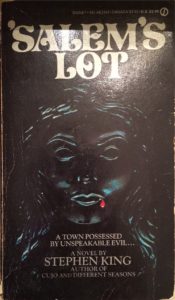 Sometimes you have to go out on a limb and say something is the best, even though you’re invoking a hotbed of controversy rivaled only by that of internet geeks arguing about who would win in a fight between Picard’s Enterprise and the Death Star. It’s an entirely different controversy, I’ll admit, but when you’re rating the best in vampire creativity, there are definitely people who will be every bit as passionate on the topic. For example, best vampire TV show? Buffy the Vampire Slayer, no question. But I know offhand of one person who reads this who will immediately disagree. Best vampire movie? I tend to put my money on Fright Night, despite the pretty terrible name. Then there are books. Blah blah blah Anne Rice cakes (and then there’s the Anita Blake vamporn I’ve been reading), but where I have a really hard time is with Dracula. Because that is a damn fine piece of literature. And yet, I must go where my taste leads me and pick my personal favorite. Thusly, ‘Salem’s Lot.
Sometimes you have to go out on a limb and say something is the best, even though you’re invoking a hotbed of controversy rivaled only by that of internet geeks arguing about who would win in a fight between Picard’s Enterprise and the Death Star. It’s an entirely different controversy, I’ll admit, but when you’re rating the best in vampire creativity, there are definitely people who will be every bit as passionate on the topic. For example, best vampire TV show? Buffy the Vampire Slayer, no question. But I know offhand of one person who reads this who will immediately disagree. Best vampire movie? I tend to put my money on Fright Night, despite the pretty terrible name. Then there are books. Blah blah blah Anne Rice cakes (and then there’s the Anita Blake vamporn I’ve been reading), but where I have a really hard time is with Dracula. Because that is a damn fine piece of literature. And yet, I must go where my taste leads me and pick my personal favorite. Thusly, ‘Salem’s Lot.
It’s possible that, insofar as the story is about the town of Jerusalem’s Lot more than it’s about vampires, I am making an unfair judgment. Because, really, it’s an excellent study of a small town in decline far more than it’s a vampire story. (Well, I say that, but almost everything I know about small town New England I learned from Stephen King, so if he’s actually not an authority on the subject, then it would probably be impossible for me to be more wrong about my current related assumptions.) So, you’ve got this pleasant little town, not too much industry but enough to not dry up, most of the people know most of the other people, and most of them are friendly toward one another. It might be on the edge of the metaphorical cliff, but it’s got good balance, so long as nothing shoves too hard.
Of course the shove has to come, though, or you don’t have a story. More traditional books on the same basic topic might toss out, at this point, a contentious election cycle or a sudden land bust. Or, particularly luridly for the type, a kidnapping or a murder. In King’s case, we have something seemingly more innocent. Nothing more than two men that have been set on a collision course as if by the guiding hand of fate. (Ha ha, that’s my little joke, see? Because it’s a novel, and has certain plot requirements.) On one side, author Ben Mears is returning to the home of his childhood to exorcise some demons, answer some questions of himself, and put together his next book. On the other side, furniture salesmen Barlow and Straker, who would seem substantially less portentous if one of them was not a vampire. And in the middle, high on a hill overlooking ‘salem’s Lot “like some dark idol”, the Marsten house, site of a childhood trauma for Mr. Mears and, some decades earlier, site of a murder/suicide perpetrated by owner Hubert Marsten; most recently, it is the residence of choice for Mr. Barlow and his associate. After all, he was invited by Hubert Marsten, in the months before that fellow’s grisly demise. Well, and there’s also the kidnapping/murder. King has never shied away from the lurid. But that’s more an effect than a cause, really.
Provided players and a stage, all that is left is the determination of which people will choose a side and which people will have a side chosen for them by the rapidly spreading vampiric disease. And then, of course, the attempt by our heroes to fight back and save ‘salem’s Lot. And that part has a lot in common with the best of vampire literature, so really the only difference is the town itself. And the town is a place worth knowing, because, at least for now, it lives. And there aren’t a lot of settings that really live, for me. Anyway, it’s been out for thirty-one years. If you haven’t read it by now, don’t you think you ought to?
Pingback: Shards of Delirium » Cycle of the Werewolf
Pingback: Fright Night (2011) | Shards of Delirium